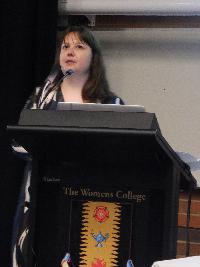Interpreting only into native language? Thread poster: Hannah Burrow
|
|---|
Hannah Burrow 
United Kingdom
Local time: 07:27
French to English
+ ...
Hello,
I have an MSc in Translating and Interpreting from 2011. Since then, I have almost exclusively been doing translation work. I now want to do more interpreting. For the degree, we only interpreted into our native language, and my question is: how realistic/desirable is it to interpret only into one's native language? I do see that for DPSI etc. you need to be able to interpret into your B language too.
Thanks for any help
Regards
Hannah
| | | | Jan Rausch 
Germany
Local time: 14:27
German to English
+ ...
| Bidirectional required | May 3, 2018 |
Hi Hannah,
On the private market, you definitely have to be able to interpret in both directions between your A and B. (Otherwise it would be a C language.)
It is only at the institutions that interpreters work into one language only.
I hope this helps.
Best,
Jan
| | | | Robert Forstag 
United States
Local time: 08:27
Spanish to English
+ ...
| Agree with Jan | May 3, 2018 |
The notion of interpreting in one direction only is impractical in the real world.
Hannah: I would say that you were ill-served by your program of study and that, if you now want to offer interpreting services, you will need to develop your skills from English into your non-native language(s) in order to receive serious consideration from potential clients.
| | | | Hannah Burrow 
United Kingdom
Local time: 07:27
French to English
+ ...
TOPIC STARTER
Thanks for your help, much appreciated
| | |
|
|
|
Vanda Nissen 
Australia
Local time: 22:27
Member (2008)
English to Russian
+ ...
| I agree with my colleagues | May 3, 2018 |
I have never been asked to interpret into Russian only, it is always both ways. Hannah, perhaps, you should try contacting a few agencies. Interpreting at schools (parent-teacher meetings), community events would be a good start. Avoid medical interpreting, at least in the beginning because it will require profound knowledge of medical terminology which is always harder in your L2 especially when you do not live in the country of your non-native language.
| | | | | Unless you work for the EU/UN | May 4, 2018 |
The EU and UN usually require their interpreters to work from several passive languages into their mother tongue. So it depends on the market you are aiming for.
| | | | | Relay interpreting | May 13, 2018 |
Most conference assignments on the European market involve working into your mother tongue AND working into a relay language when your language is spoken on the conference. This way, you will typically have one language on the conference for which there is no dedicated booth, i.e. when a conference is using, say, five languages, only four will have a dedicated booth. Typical relay languages are English and French. The reason of this is cost savings. You eliminate a booth.
In other w... See more Most conference assignments on the European market involve working into your mother tongue AND working into a relay language when your language is spoken on the conference. This way, you will typically have one language on the conference for which there is no dedicated booth, i.e. when a conference is using, say, five languages, only four will have a dedicated booth. Typical relay languages are English and French. The reason of this is cost savings. You eliminate a booth.
In other words: you absolutely need your B languages to survive on the European market.
I have done a couple of thousands of interpreting assignments since 1994, and I would say that 95 % of the work involves working in both directions. In the EU institutions, you only work into you mother tongue, on the free market, you also work into your B languages.
If your training didn't involve interpreting into your B languages, that's a problem. All university interpreting curricula should have simultaneous, liaison and consecutive interpreting between your A and B languages, in both directions. Also, if you graduated in 2011, your B languages have most probably become passive (i.e. C). You'll need to reactivate them by spending time abroad.
Kind regards,
Frank ▲ Collapse
| | | | To report site rules violations or get help, contact a site moderator: You can also contact site staff by submitting a support request » Interpreting only into native language? | Protemos translation business management system | Create your account in minutes, and start working! 3-month trial for agencies, and free for freelancers!
The system lets you keep client/vendor database, with contacts and rates, manage projects and assign jobs to vendors, issue invoices, track payments, store and manage project files, generate business reports on turnover profit per client/manager etc.
More info » |
| | CafeTran Espresso | You've never met a CAT tool this clever!
Translate faster & easier, using a sophisticated CAT tool built by a translator / developer.
Accept jobs from clients who use Trados, MemoQ, Wordfast & major CAT tools.
Download and start using CafeTran Espresso -- for free
Buy now! » |
|
| | | | X Sign in to your ProZ.com account... | | | | | |









